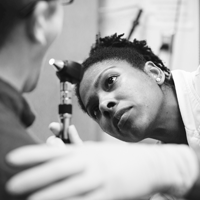Medical Director - Primary Care - Outpatient Center
SUMMARY
The Medical Director is a Grady Health System physician that serves as the physician leader of a Grady Clinic. The medical director will serve as the liaison between Grady administration and the Clinic for all matters regarding the delivery of medical services, program management, and medical operations. In addition to maintaining an active clinical footprint, the medical director will support the mission, vision, goals and values of Grady Health System, primarily through collaboration with executive leadership in shaping and managing the implementation of the Grady strategy, while focusing on clinical excellence through the provision of quality, consistent, patient-centered care across Grady as it relates to the practice of medicine. The individual in this role is expected to communicate with all levels of staff, including clinicians, clinic staff members, and executives. The medical director must have operational knowledge and leadership skills that promote a culture of engagement throughout the workforce at their facility and Grady.
Location: Cascade Outpatient Center
QUALIFICATIONS
- Doctorate of Medicine (M.D.) is required
- Experience in management of primary care medical practice
- Licensed by the State of Georgia without restriction to practice medicine
- Board certified in a Primary Care specialty including internal medicine, pediatrics, family medicine or preventive medicine
Required Minimum Experience:
Five (5) years practicing as a physician in an outpatient healthcare setting.
Required Minimum Skills:
• Demonstrated leadership skills and knowledge.
• Strong interpersonal skills with ability to work collaboratively in multi-specialty medical groups.
• Excellent physician relations skills and previous experience in growing volume and managing quality improvement.
• Skills including strategy development, program evaluation, budget consideration, and execution of programs and services to achieve quality standards.
• Excellent understanding of clinical and technology trends related to the delivery of healthcare services.
• Excellent communication skills – verbal, written, listening, and presentation along with the confidence to favorably represent the organization in both formal and informal settings.
• A firm commitment to delivering high quality healthcare services with an unparalleled commitment to customer service as a necessary component for success.
Grady Core Leadership Competencies
Communication: Communicate well both verbally and in writing. Use good listening skills and listens attentively. Build strong relationships. Shares information and ideas with others. Solicit feedback and handles constructive criticism. Ask clarifying questions. Stay open to other viewpoints. Creates accurate and punctual reports when needed and delivers presentations effectively when asked.
Customer Focus: Create a memorable and positive customer/patient experience. Build customer and patient confidence. Commit to increasing customer and patient satisfaction. Set achievable customer expectations. Assume responsibility for solving customer problems. Ensure commitments to customer are met. Solicits opinions and ideas from customers. Contribute improvement ideas.
Financial Stewardship: Plans for and uses resources efficiently, always looks for ways to reduce costs.
Integrity/Ethics: Deals with others in a straightforward and honest manner, is accountable for actions, maintains confidentiality, supports company values, conveys good news and bad.
Teamwork/Dependability: Meets all team deadlines and responsibilities, listens to others and values opinions, helps team leader to meet goals, welcomes new team members, and promotes a team atmosphere. Meets commitments, works independently, accepts accountability, handles change, sets personal standards, stays focused under pressure, meets attendance/punctuality requirements.
Job Knowledge: Understands duties and responsibilities, has necessary job knowledge, has necessary technical skills, understands company mission/values, keeps job knowledge current, is in command of critical issues.
Problem Solving/Analysis: Breaks down problems into smaller components, understands underlying issues, can simplify and process complex issues, understands the difference between critical details and unimportant facts.
Quality/Safety: Demonstrates consistent application of error prevention skill and High Reliability Organization (HRO) principles, attentive to detail and accuracy, is committed to excellence, looks for improvements continuously, monitors quality levels, finds root cause of quality problems, owns/acts on quality problems. Promotes mutual respect and keeps workplace clean and safe.
Trust/Engagement:
A. Builds a culture of trust and engagement as reflected in the Great Place to Work Trust Index Survey at a direct report and hospital/entity level.
B. Holds leaders accountable for behaviors that create trust and engagement.
C. Performs all duties and responsibilities of this position in a manner that reflects the values of Grady.
D. Maintains and strengthens relationships with active physicians and assures their involvement in developing systems to assure the growth of the service and the cost-effective delivery of quality patient care in a manner that fosters patient and employee satisfaction.
Results Oriented Leadership:
A. Sets challenging and productive goals for team.
B. Holds team accountable for actions while providing leadership and motivation.
C. Provides resources and supports.
D. Uses checkpoints and data to track progress, setting up system and processes to measure results.
Collaboration and Partnership:
A. Works collaboratively and as a team member with health system leadership. Partners with Human Resources to achieve desired organizational culture, staffing and workforce metrics.
B. Fosters positive working relationships between staff and physicians across the clinic.
C. Fosters a safe work culture.
ROLE SPECIFIC COMPETENCIES, RESPONSIBILITIES, ROLES, AND FUNCTIONS: A set of competencies and functions that define the job’s reason for existence and the competencies needed to perform the job. Not to be confused with core competencies.
1. Operational Management
a. Hold regular documented meetings (at least monthly) with clinic clinicians (physicians and advanced practice professionals) to discuss systems/patient flow quality, improvement in scheduling, and patient and physician relationships. Holds monthly 1:1 meetings with physicians and advanced practice professionals during medical director’s administration time.
b. Participate and meet at least monthly with Vice President of Community Medicine to review progress of assigned clinic.
c. Assist in the professional development and growth of each individual clinician in assigned clinic.
d. Assist in development, regularly review, and annually sign off on, as approved and updated, the latest Joint Commission standard policies, procedures, and medical protocols regarding patient care.
e. In conjunction with Grady leadership, provide guidance regarding policies, personnel, services, marketing, quality improvement, and education.
f. Regularly assess medical staff perceptions and needs of the medical facilities to ensure a harmonious working relationship and provide leadership to practitioners resulting in overall facility improvement by encouraging teamwork and participation.
ii. Assisting in any necessary face-to-face or phone interviews, recruitment, placement, counseling, and/or termination of physicians
iii. Orienting new clinicians and monitoring their ongoing compliance with policies and procedures.
iv. Coordinating clinicians’ schedules to ensure efficiency and maximum productivity.
v. Being responsible for receiving and assisting with the investigating of all complaints, grievances or questions of policy concerning any clinician or the medical facilities.
vi. Providing medical leadership and overall supervision to all clinicians.
vii. Interceding in and providing counseling, retraining, direction, and discipline to physicians regarding quality, productivity, and behavioral issues.
h. Works closely with other physician and operational leaders to achieve the organizational goals.
i. Assist in an efficient and expeditious operation of medical practices, providing input on budgets, billing and equipment.
j. Interact closely with facility administration to develop goals and provide ongoing assessment to achieve objectives, in keeping with Grady’s strategic plan(s).
k. Work cooperatively and supportively with medical practice administration and physicians to ensure services are available and cost effective, meeting quality and regulatory guidelines.
l. Review and monitor the following reports as they relate to the organizational/facility specific goals: monthly quality metrics; billings; charges; scheduling; productivity; and other reports as reasonably requested.
m. Interact with the medical staff, specialists, and community physicians to ensure appropriate and timely patient care, patient transfers, and patient referrals.
n. Work cooperatively and supportively with department leaders to ensure availability and effectiveness of services and results reporting.
2. Quality Improvement
a. Assist with development and maintenance of continuous quality improvement programs, ensuring continuous and assurance of compliance of physician quality care/safety programs.
b. Promote and monitor ambulatory provider attendance at clinician meetings.
c. Ensure the clinic achieves and maintains Joint Commission, managed care and other accreditations.
d. Assist in development, coordination, and completion of educational programs for providers, staff, patients, and community.
e. Oversee compliance with managed care requirements, including timely and appropriate medication formulary utilization and specialist referrals.
3. Clinical Assessment
a. Physician shall provide quality care to all patients under his/her service in a safe and efficient manner and shall report to Vice President of Community Medicine
b. Physician shall provide appropriate medical services and coordination of care to all patients presented to him/her through Grady clinic.
c. Physician, along with the other clinicians, shall collaborate to develop and shall utilize Evidence Based Medicine (EBM) protocols for targeted diagnosis.
d. Physician agrees to cooperate with, participate in, and comply with, the quality assurance, risk management and peer review programs, grievance procedures and utilization control mechanisms implemented by Grady Health System.




